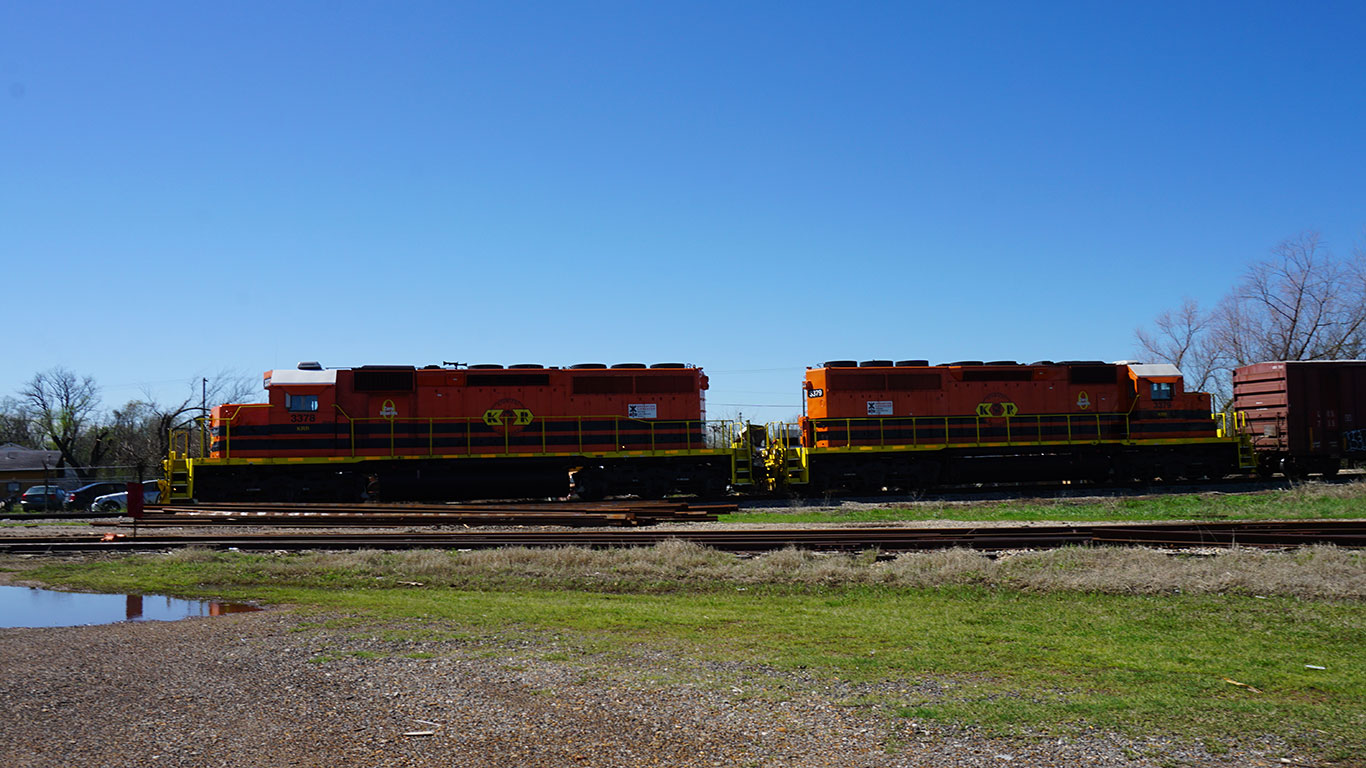
Photo by Michael Barera
November 21, 2022
Media Advisory: SIU prof can discuss impact of largest rail union’s rejection of deal
 CARBONDALE, Ill. — Gregory D. DeYong, a Southern Illinois University Carbondale associate professor of operations management, is available for interviews about the increased chance of a rail strike and the impact it would have on the already tenuous supply chain, following today’s (Nov. 21) rejection of a proposed contract by the largest rail union, the Sheet Metal, Air, Rail and Transportation (SMART-TD) union, which represents about 28,000 employees. DeYong can be reached at gdeyong@business.siu.edu.
CARBONDALE, Ill. — Gregory D. DeYong, a Southern Illinois University Carbondale associate professor of operations management, is available for interviews about the increased chance of a rail strike and the impact it would have on the already tenuous supply chain, following today’s (Nov. 21) rejection of a proposed contract by the largest rail union, the Sheet Metal, Air, Rail and Transportation (SMART-TD) union, which represents about 28,000 employees. DeYong can be reached at gdeyong@business.siu.edu.
Although eight of the 12 unions have approved the new contract, including the Brotherhood of Locomotive Engineers and Trainmen (BLET) this week, DeYong said, the unions that rejected the pact represent the majority of the railroad employees. If even one union goes on strike after an early December strike deadline, all unions will honor the work stoppage.
“One of the smallest and oldest unions, the International Brotherhood of Boilermakers, Blacksmiths, Iron Ship Builders, Forgers and Helpers (IBB), representing about 300 to 500 members, may hold the keys to the potential strike,” DeYong said. “As one of the first unions to reject the proposed contract, they could strike as soon as Dec. 9 — one of the first unions to face a strike decision. Since it’s unlikely that other union members will cross picket lines, a few hundred IBB members may well spark a strike that idles over 100,000 employees and brings rail transport to a standstill.”
DeYong said negotiations continue on a revised contract but that union membership has proven unpredictable thus far, with the rank-and-file members already rejecting the deal proposed by the Presidential Emergency Board in August.
While negotiations and strike-averting mechanisms are governed by the National Railway Labor Act, approved in 1926, he said, one of the major concerns expressed by union members is that the 24% proposed pay raises over the next three years pale in comparison to inflation, which is at 40-year high levels. In addition, proposed fringe benefits, including sick time, are unsatisfactory to some personnel.
“This process badly misjudged the sentiments of union members,” DeYong said. “The union members criticized the failure of the contract to address working condition complaints as well as the inadequacy of the proposed pay increases in the face of continuing high inflation.”
Coupled with the significant impact of a rail strike on the supply chain are low water levels on the inland waterways, particularly the Mississippi River, and the looming diesel fuel shortage, he said. Mississippi River barge traffic is already restricted for this slowest of freight modes, and although lower water levels aren’t uncommon, the reduced barge traffic and capacity and dredging delays “exacerbate already challenging problems,” he said.
He notes that the diesel fuel shortage is driven by lack of capacity in both refining and pipelines, with no new refineries built since 1977 and one of the most critical pipelines, the Colonial Pipeline, constructed in the 1960s. Typically refineries shift some capacity from diesel fuel to its close cousin, heating oil, as winter heating season approaches.
“Unfortunately, historically low diesel fuel stockpiles, coupled with a Biden administration plan to force suppliers to increase diesel fuel inventory, is putting added pressure on already stretched refining capacity,” he said.
He said the good news is that most holiday gifts are already in stores or on their way there and retail inventories are at record levels, due in part to retailers increasing early purchasing in anticipation of supply chain issues. But there is a big concern about holiday travel since Thanksgiving, Christmas and New Year’s Day are three of the most popular travel holidays in the country so travelers may encounter higher costs. Another concern is the ability to heat homes this winter, particularly in the northeast part of the United States, since “the need to balance heating oil production against diesel fuel refining, combined with generally scarce refinery capacity has led to much tighter supplies of heating oil than the historical norm.”
He anticipates northeasterners will likely see a 25% increase in heating costs this year, and that in the Midwest, natural gas price (the main source of heating in the region), recently dropped from 14-year highs but remain well above the 5-year average.
Other issues affecting the supply chain include diseases such as the avian flu and the war in Ukraine.
DeYong has firsthand knowledge in supply chain management. Before becoming an SIU Carbondale faculty member, he worked as an import/export manager responsible for about $100 million in products annually. DeYong is currently working to establish a Center for Supply Chain Management and Logistics within the College of Business and Analytics.
